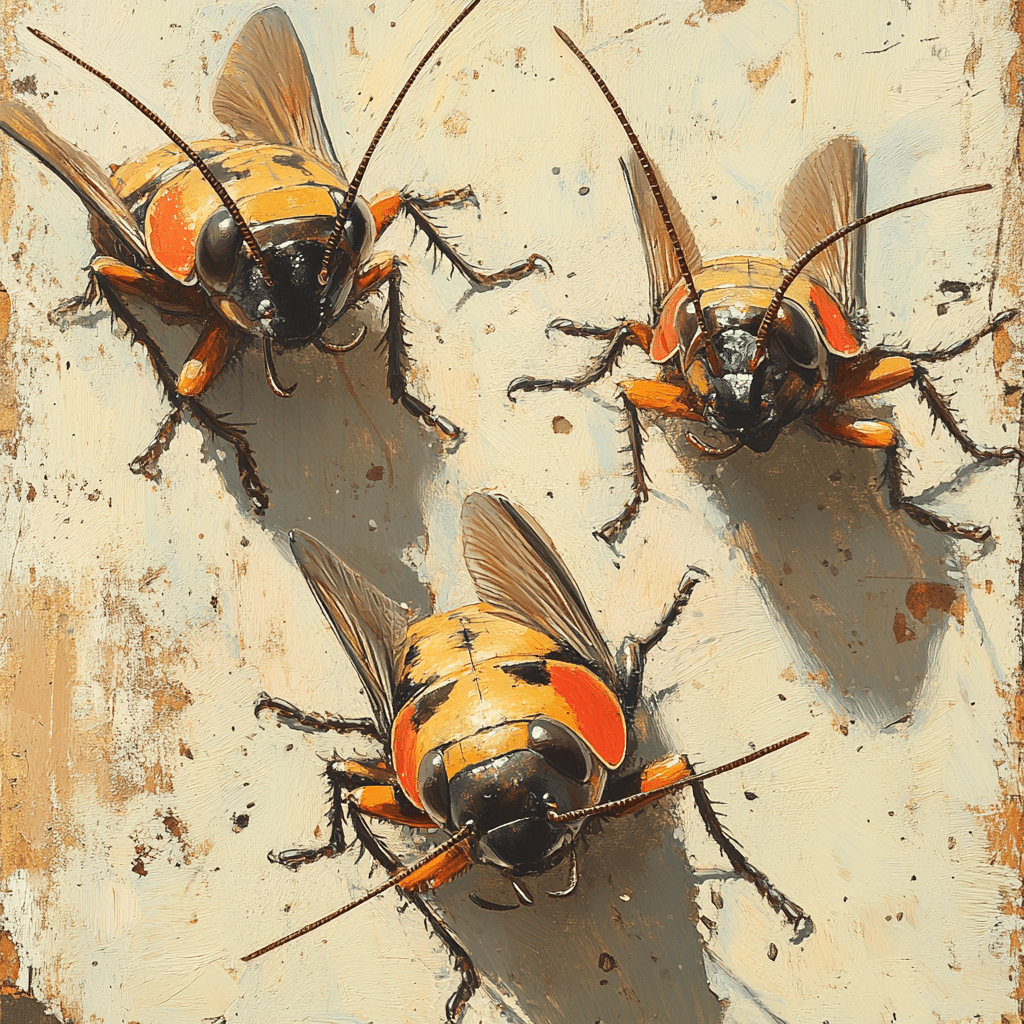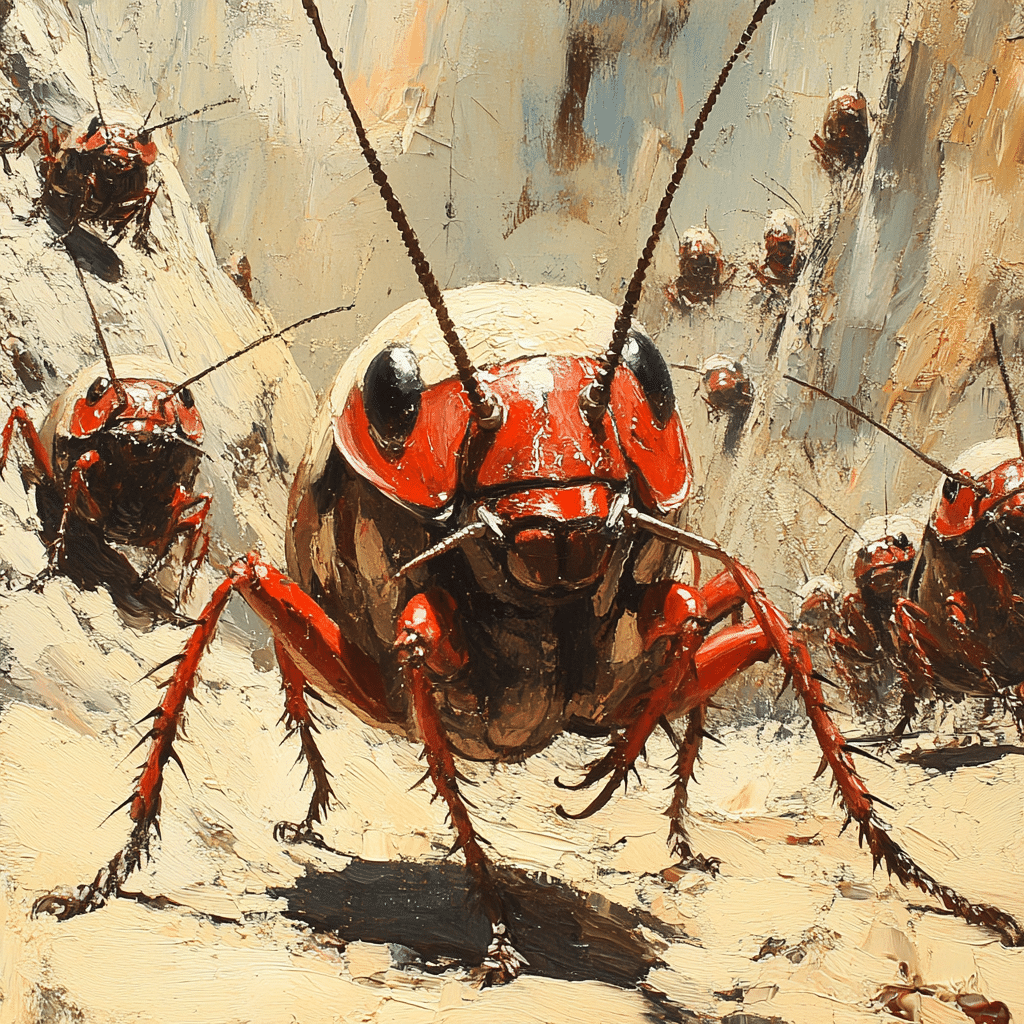Roaches. Just the mention of these unwanted pests sends a shiver down most spines. These resilient insects are found in homes and businesses around the globe, but the real threat they pose goes far beyond that pesky feeling of discomfort. Roaches are notorious for being unhygienic scavengers, as highlighted by the World Health Organization (WHO). They can undermine our health in various alarming ways, impacting everything from allergies to food safety. Let’s dive deep into the health hazards posed by roaches and discuss effective ways to combat their presence.
The Dangers of Roaches: More Than Just Unwanted Guests
The chilling reality is that roaches can invade even the cleanest homes, seeking food, water, and shelter. They sneak in through tiny cracks in walls, open doors, and plumbing systems. Once they’re inside, their impact can be swift and severe. With that, let’s take a close look at the seven significant health hazards associated with roaches.

1. Allergies Triggered by Roach Droppings
Roaches produce allergens that can trigger severe allergic reactions in sensitive individuals. According to the Journal of Allergy and Clinical Immunology, their droppings and shed skin can worsen asthma and allergies, especially in urban environments where roach populations can swell. Notably, these allergens can linger in the air for months, making early detection and action absolutely crucial. Families that have a history of allergies should be especially vigilant.
What’s more concerning is how easily these droppings become airborne. When we vacuum or clean surfaces, we risk releasing these pesky allergens back into the air. This creates an insidious cycle that may exacerbate health issues. If you suspect a roach presence, it’s imperative to act fast.
2. Transmission of Bacteria and Pathogens
Roaches aren’t just yucky; they’re also a health risk. They can carry bacteria like Salmonella and E. coli, which are known to cause serious gastrointestinal illnesses. A research study conducted by the University of California highlighted how roaches can pick up these pathogens from decaying organic matter. By crawling over kitchen surfaces, they can easily contaminate our food supplies.
This transmission doesn’t happen in a bubble. As common roaches invade our homes, they can introduce these bacteria into our food preparation areas. It’s a stark reminder that maintaining a clean kitchen is not just about aesthetics – it’s a crucial practice for health safety. You may think a quick wipe-down is enough, but it might not cut it when roaches are in play.
3. The Link Between Roaches and Gastroenteritis
Gastroenteritis, or inflammation of the stomach and intestines, can be exacerbated by roach presence. The Centers for Disease Control and Prevention (CDC) points out that households with roaches have an increased likelihood of gastrointestinal infections. Symptoms like nausea, vomiting, and diarrhea can leave individuals feeling utterly miserable, and vulnerable populations such as the elderly and young children are at even greater risk for severe dehydration as a result.
As gastrointestinal infections from roaches become more common, recognizing the signs early can be critical. If you notice symptoms alongside a potential roach infestation, seek medical advice right away. Addressing the root cause can significantly improve family health in the long run.
4. Mental Health Impacts of Roach Infestations
Living with roaches can take a significant toll on mental health. Anxiety, stress, and feelings of helplessness can mount as individuals wrestle with infestations. Research published by the American Psychological Association demonstrates a clear connection between roach presence and heightened anxiety levels, leading to increased feelings of disgust and fear.
In many cases, the psychological impact can be as troubling as the physical health issues. People affected may feel a loss of control over their living spaces, leading to long-term emotional distress. Addressing both mental and physical health impacts should remain a priority in managing these pests.
5. Roaches and Asthma: A Critical Connection
For individuals with asthma, roach exposure can trigger extreme health risks. The American Academy of Allergy, Asthma, and Immunology reports a direct link between roaches and increased asthma symptoms. Their droppings and body fragments can initiate asthma attacks, with studies showing a notable spike in hospital visits during peak infestation seasons.
Taking preventative measures becomes even more essential for asthma sufferers. Regularly checking your home for signs of roach activity can help mitigate triggers and keep respiratory issues at bay.
6. Contamination of Food and Surfaces
Food contamination remains one of the most apparent hazards roaches bring into our homes. Not only do they nibble on food supplies, but their very presence can make kitchens and pantries unsanitary. A 2022 study gathered data on restaurant violations due to roach infestations, highlighting the potential for foodborne illness outbreaks that could severely damage reputations and finances.
For restaurant owners, maintaining stringent health codes means understanding the risks posed by roaches. It’s a wake-up call for local establishments to prioritize cleanliness and pest management as a critical component of their operational strategy.
7. The Economic Burden of Roach-Related Health Issues
Lastly, let’s talk about the economic implications of roach infestations. The CDC estimates that healthcare costs associated with allergies and asthma can balloon to billions annually due to roach exposure. This figure doesn’t only impact individuals; businesses dealing with infestations risk fines, costly remediation, and reputational damage that can take years to recover from.
It’s clear that a roach infestation isn’t just a personal nuisance; it’s a pressing public health and economic issue. Taking action against these pests can save money and promote overall community health.
Attacking the Roach Problem: Prevention Strategies
To keep your environment roach-free, effective preventative measures need to become routine. From mothers keeping kitchens spotless to restaurant owners ensuring compliance with health regulations, everyone plays a part. Here are several tried-and-true strategies to combat these tenacious pests:
These preventative measures don’t just apply to individual homes; they can be implemented at the community level to foster a healthier environment.

Raising Awareness: The Next Steps in the Fight Against Roaches
Understanding the dangers of roaches is essential for fostering ur proactive pest management approach. Community education programs can play a crucial role in spreading awareness about the health risks associated with roaches. They can equip individuals with the necessary knowledge to prevent infestations from taking root.
By addressing both health concerns and the psychological damage caused by roaches, we can pave the way toward cleaner, healthier living spaces. Multi-faceted approaches that combine individual, community, and policy efforts can create a solid defense against the health risks posed by roaches, ensuring a brighter, healthier future for every household.
In this ongoing battle against roaches, it’s clear: knowledge is power. By staying informed and taking action, we can reclaim our spaces and protect our health.
Roaches: The Uninvited Guests
Creepy-Crawly Facts
Ever wondered just how resilient roaches really are? These pests have been around for about 350 million years, adapting long before humans were even a thought! Known for their incredible speed, roaches can scuttle up to three miles an hour. That’s a lot faster than you might imagine! If you find yourself enchanted by quirky characters, check out some of the most bizarre, like those from furry Manga, which, believe it or not, may share a certain charm with our creepy, crawly friends.
Health Concerns and Hidden Dangers
Roaches aren’t just ugly; they’re a major health risk, too. They carry more than 30 kinds of bacteria, including bacteria that cause food poisoning. Gross, right? While you’re pondering these little intruders, you might find it helpful to research Restaurants similar To Olive garden to see how clean your local dining spots really are. Remember, even the best meals can be ruined by unwanted guests!
The Great Escape Artists
Now, here’s another fun fact: roaches can live for up to a week without their heads! This makes them masters of survival, a little like Robinson Crusoe, who had to endure the wild on his own. Speak of adventure, you can learn more about his tale by checking out the story of Rodolfo Sancho, a character who found himself in his own fight for survival. Just like in movies, the struggle against roaches is a real-life challenge that many face.
Keep in mind; the best way to win the battle against roaches is through prevention! If they’ve already made your place their home, don’t fret! There are plenty of ways to evict them. Reading up on things like NI heating oil Prices might not seem relevant, but ensuring your space is sealed well and kept clean can make a world of difference. With a little knowledge, you can stay one step ahead of these pesky invaders!

Is it bad to kill roaches?
Killing roaches isn’t the best way to deal with them because it can actually spread bacteria they carry. Instead of squashing them, it’s better to focus on preventing and controlling them in your home.
Why do cockroaches suddenly appear?
Cockroaches may suddenly appear due to changes in your environment, like a lapse in cleanliness, introducing new food storage habits, or even seasonal shifts that affect their behavior. They’re always on the lookout for food and shelter.
What is the main cause of roaches?
The main causes of roach problems often boil down to food sources, water availability, and places to hide. Crumbs, spills, and clutter provide perfect conditions for these pests to thrive.
Are roaches hard to get rid of?
Roaches can be tricky to get rid of since they multiply quickly and hide well. Taking steps to eliminate their food sources and using proper pest control methods will help manage their presence.
Why should you not squish a roach?
It’s best not to squish a roach because doing so can spread pathogens they’ve picked up from dirty surfaces. Instead, focus on using traps or sprays designed for roach control.
Should I kill a roach if I see it?
If you see a roach, you might feel the urge to kill it, but it’s smarter to eliminate the conditions that let it thrive instead. Take measures to clean up and look for ways to prevent more from coming in.
What smell do roaches hate?
Roaches really dislike strong scents like citrus, peppermint, lavender, and vinegar. Spraying these around can help keep them at bay since they tend to avoid such smells.
How to make a cockroach go away?
To make a cockroach go away, you’ll want to keep your home clean and dry, especially in the kitchen. Sealing up potential entry points and using roach baits or traps can also help push them out.
Why do roaches come in my clean house?
Roaches can enter even the cleanest of homes seeking food, water, and hiding spots. Uncovered food or gaps in doors and windows can draw them in despite your best cleaning efforts.
What to do if I see a cockroach?
If you spot a cockroach, clean up immediately to eliminate its food sources. Consider setting traps, sealing cracks, and possibly consulting a pest control professional for further help.
What do roach nests look like?
Roach nests can look like little dark smudges or clusters, often in hidden areas like behind appliances or in cabinets. They can also be made of egg cases that are brown and leathery.
Should I be worried if I see one cockroach?
Seeing one cockroach can be a sign that more are lurking nearby, so it’s wise to take action. Don’t ignore it; try to investigate further and tackle any potential infestation spread.
Will roaches go away on their own?
Roaches may not necessarily go away on their own, especially if food and shelter are available. It’s best to take proactive measures to control their population instead of just waiting for them to leave.
What is the best thing to keep roaches away?
To keep roaches away, maintain a clean and dry environment, seal off entry points, and consider using traps or natural repellents. Keeping food stored properly can also significantly help.
How do you get rid of 100% roaches?
Getting rid of 100% of roaches usually requires a combination of cleaning, sealing entry points, and using effective pest control strategies, including baits or professional extermination if necessary.



